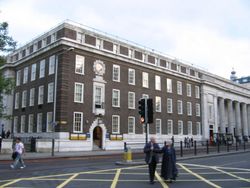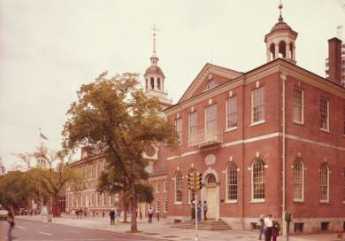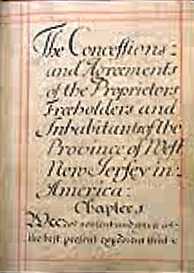Related Topics
...Ratification, Bill of Rights and Other Amendments
The 1787 Constitution lacked a Bill of Rights. Few except Madison himself were opposed to adding one, but many other delegates would have failed election without promising it. Negotiations at the Convention had proved so excitingly innovative that time ran out before the Convention had to adjourn with only a promise of a Bill of Rights, first thing.
Religious Philadelphia
William Penn wanted a colony with religious freedom. A considerable number, if not the majority, of American religious denominations were founded in this city. The main misconception about religious Philadelphia is that it is Quaker-dominated. But the broader misconception is that it is not Quaker-dominated.
Philadelphia Politics
Originally, politics had to do with the Proprietors, then the immigrants, then the King of England, then the establishment of the nation. Philadelphia first perfected the big-city political machine, which centers on bulk payments from utilities to the boss politician rather than small graft payments to individual office holders. More efficient that way.
Quakers: The Society of Friends
According to an old Quaker joke, the Holy Trinity consists of the fatherhood of God, the brotherhood of man, and the neighborhood of Philadelphia.
Pacifist Pennsylvania, Invaded Many Times
Pennsylvania was founded as a pacifist utopia, and currently regards itself as protected by vast oceans. But Pennsylvania has been seriously invaded at least six times.
Shaping the Constitution in Philadelphia
After Independence, the weakness of the Federal government dismayed a band of ardent patriots, so under Washington's leadership a stronger Constitution was written. Almost immediately, comrades discovered they had wanted the same thing for different reasons, so during the formative period they struggled to reshape future directions . Moving the Capitol from Philadelphia to the Potomac proved curiously central to all this.
Federalism Slowly Conquers the States
Thirteen sovereign colonies voluntarily combined their power for the common good. But for two hundred years, the new federal government kept taking more power for itself.
Right Angle Club 2010
2010 is coming to a close, a lame-duck session is upon us, and probably after that will come two years of gridlock. But the Philadelphia Men's Club called the Right Angle, keeps right on talking about the current scene. A few of these current contents relate to speeches given elsewhere.
Robert H.Bork Upsets A Century of Antitrust Law
According to the late Robert H. Bork, it ought to be fairly easy to identify price-fixing, because legitimate cases that harm the consumer by price manipulation aren't common, or may not even exist. With this, Bork convinced the judiciary to abandon a century of contrary belief while still a young law professor, thus establishing his own reputation with Ronald Reagan. He was appointed Solicitor General by Richard Nixon, unfortunately thus embroiling himself in Nixon's impeachment.
First Amendment: Separation of Church and State
 Amendment 1 Congress shall make no law respecting an establishment of religion, or prohibiting the free exercise thereof; or abridging the freedom of speech, or of the press, or the right of the people peaceably to assemble and to petition the government for a redress of grievances. 
|
| The First Amendment |
Simplified histories of America often declare that other Western Hemisphere colonists mostly came to plunder and exploit; whereas English Protestant colonists came with families to settle, fleeing religious persecution. That's a considerable condensation of events covering three centuries, but it is true that before the Revolutionary War, eleven of the thirteen American colonies approximated the condition of having established religions. Massachusetts and Virginia, the earliest colonies, had by 1776 even reached the point of rebelliousness against their religious establishments. The three Quaker colonies (New Jersey, Pennsylvania, and Delaware) were late settlements, in existence less than a century before the Revolution, and still comfortable with the notion they were religious utopias. While differing in intensity all colonials respected the habits of thought and forms of speech, natural to utopians residing in a religious environment.
Once Martin Luther had let the Protestant genii out of its religious bottle, however, revisionist logic was pursued into its many corners. Ultimately, all Protestant questers found themselves confronting -- not religious dogmatism, but it's opposite -- the secularized eighteenth-century enlightenment. Comparatively few colonists were willing to acknowledge doubts openly about miracles and divinity. However, private doubts were sufficiently prevalent among colonial leaders to engender restlessness about the tyrannies and particularly the rigidities of the dominant religions. To this was added discomfort with self-serving political struggles observable among their preachers, and alarm about occasional wars and persecutions over arguably religious doctrines. Arriving quite late in this evolution of thought -- but not too late to experience a few bloody persecutions themselves -- the Quakers sought to purify their Utopia by eliminating preachers from their worship entirely. Thus, the most central and soon the most prosperous of the colonies made it respectable to criticize religious leaders in general for the many troubles it was believed they provoked.

|
| London Yearly Meeting |

|
| Congress Hall |
In all wars, diplomatic arts and religious restraints get set aside as insufficient, if not altogether failures for an episode of utter barbarism. In the Revolution, some Quakers split from pacifism and became Free Quakers, many more drifted into Episcopalianism, never to return to pacifism. The Constitutional Convention of 1787 was eventually held in this persisting environment; the previous service in the War counted for something, and the great goal was to strengthen the central government -- for more effective regional defense. A great many leaders were Masons, holding that much can be accomplished by secular leadership, independent of religious reasonings. Neither Washington nor Madison revealed much of their religious positions, although Washington the church attender always declined communion; Franklin and probably Jefferson were at heart deists, believing that God might well exist, but had wound up the universe like a clock to let it run by itself. The New England Calvinist doctrines have since evolved as Unitarianism, which outsiders would say theologically is not greatly different from deism. Physically surrounding the Philadelphia convention was a predominantly Quaker attitude; entirely too often, preachers get you into trouble.
When the first Congress finally met under their new constitution, they immediately confronted over a hundred Constitutional amendments, mostly submitted from the frontier and fomented by Jefferson and Patrick Henry, demanding a bill of rights. The demand within these amendments was overwhelming that the newly-strengthened central government must not intrude into the rights of citizens. Recognizing the power of local community action, states rights must similarly be strengthened. Just where these rights came from was often couched in divine terms for lack of better proof that they were innate, or natural. From a modern perspective, these rights in fact often originated in what theologians call Enthusiasm; the belief that if enough people want something passionately enough, it must have a divine source. The newly minted politicians in the first Congress recognized something had to be done about this uproar. Congress formed a committee to consider matters and appointed as chairman -- James Madison. Obviously, the chief architect of the Constitution would not be thrilled to see his product twisted out of shape by a hundred amendments, but on the other hand, a man from Piedmont Virginia would be careful to placate the likes of Patrick Henry. The ultimate result was the Bill of Rights, and Madison packed considerably more than ten rights into the package, in order to preserve the cadence of the Ten Commandments. The First Amendment, for example, is really six rights, skillfully shaped together to sound more or less like one idea with illustrative examples. Overall freedom of thought comfortably might include freedom of speech (and the press), along with freedom of religion and assembly, and the right to petition for grievances. But what it actually says is that Congress shall not establish a national religion. Since eleven states really had approximated a single established religion, the clear intent was to prohibit a single national religion while tolerating unifications within the various states. Subsequent Supreme Courts have extended the Constitution to apply to the states as well, responding to a growing recognition that religious states had the potential to get so heated as to war with each other. No matter what their doctrines, it seemed wise to deprive organized religions of political power as a firm step toward giving the Constitution itself dominant power over the processes of political selection.
At first however it was pretty clear; one state's brand of religion was not to boss around the religion of another state. Eventually within one state, Virginia for example, the upstate Presbyterian ministers were not to push around the Episcopalian bishops of the Tidewater. Madison and Jefferson saw well enough where political uprisings tended to start in those days, in gathered church meetinghouses. In this way, an Amendment originally promoted to protect religions had evolved into a way to ease them out of political power. The idea of separation of church and state has grown increasingly stronger, to the point where most Americans would agree it defines a viable republic. No doubt, the spectacle of preachers exhorting the same nation in opposite directions during the Civil War, settled what was left of the argument.
For Quakers, the most wrenching, disheartening revelation came when they were themselves in unchallenged local control during the French and Indian War. The purest of motives and the most earnest desire to do the right thing provided no guidance for those in charge of the government when the French and Indians were scalping western settlers and burning their cabins. Yes, the Scotch-Irish settlers of the frontier had unwisely sold liquor and gunpowder to the Indians, and yes, the Quakers of the Eastern part of the state had sought to buffer their own safety from frontier violence by selling more westerly land to combative Celtic immigrant tribes. A similar strategy had worked well enough with the earlier German settlers, but reproachful history was not likely to pacify frontier Scots in the midst of a massacre. The Quaker government was expected to do what all governments are expected to do, protect their people right or wrong. To trace the social contract back to William Penn's friend John Locke was too bland for a religion which prided itself on plain speech. Non-violent pacifism just could not be reconciled with the duties of a government to protect its citizens. The even more comfortably remote Quakers of the London Yearly Meeting then indulged themselves in the luxury of consistent logic; a letter was dispatched to the bewildered Quaker Colonials. They must withdraw from participation in a government which levied war taxes. And they obeyed.
Although the frontier Scots were surely relieved to have non-Quakers assume control of their military duty, the western part of the state has still neither forgotten nor forgiven. In their eyes, Quakers were not fit to be in charge of anything. Quaker wealth, sophistication and education were irrelevant; only Presbyterians are fit to rule. A strong inclination toward pre-destination lurks in that idea. Once more, the attractiveness of clear separation of church and state is reinforced.
The French and Indian War in fact had turned out fairly well; most of its victories were located on the European side of the Ocean, anyway. But twenty years later the Revolutionary War turned into a reassertion of the British conquest of all of North America, not merely the part to the west of the Appalachian mountains. To Americans, this came in the form of a demand for taxes to help pay off the costs of a war which greatly benefitted them. The Quaker colonies did not fully sympathize with rebellion, but they had once given up control of a territory larger than England rather than pay war taxes, so they were resistant to both sides in the dispute. Many prosperous and educated Quakers solved their dilemma by fleeing to Canada, but the ardent Quaker proposal for dealing with a coercive British government was not at all impractical. John Dickinson, in particular, argued that since the British motives were economic, success was most likely to come from economic counter-pressure, adroitly leveraged by three thousand miles of intervening ocean. That was shrewd and potentially effective. But the Scots-Presbyterian position was simpler and more direct. If you want us to fight your war, you are going to have to fight to win. The Virginia Cavaliers were probably more likely to win a conventional war if put in charge, but the blunt and almost savage frontiersmen were ideally suited for what has come to be called guerrilla warfare. Washington was a leader, French money was welcome and Ben Franklin was a diplomat, but the clarion call to this particular battle was the voice of Patrick Henry. All in all, the issue of established religion was far more complicated than merely the affirmation of a right to free exercise of religious belief. What united all the colonies was a recognition that, using the church, an arm of the government was just as likely to cause trouble as conducting the state as an instrument of church interests. Eventually, considering how religious America was at the time, there was remarkably little resistance to the firm separation of Church and State in its Constitution.
Originally published: Monday, December 21, 2009; most-recently modified: Wednesday, May 15, 2019
